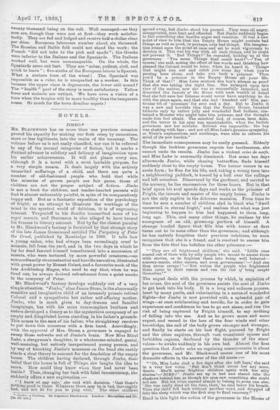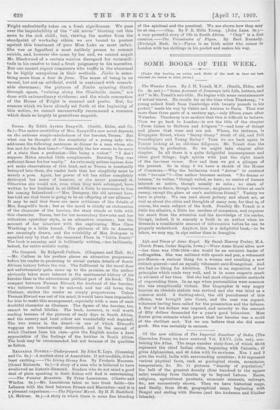NOVELS.
Jinbo a k'antaey. By Algernon Blaokwood. London klenaulllso ind Co. De. Ccl. not.) Mu. BLACKWOOD has on more than one previous occasion proved his capacity for making our flesh creep by excursions, more or less legitimate, into the realm of the uncanny. The volume before us is not easily classified, nor can it be referred to any el the normal categories of fiction, but it marks a distinct advance in subtlety and delicacy of imagination upon his earlier achievements. It will not please every one, although it is a novel with a most laudable purpose, for a very simple reason. It deals largely with the entirely unmerited sufferings of a child, and there are quite a number of old-fashioned people who hold that while the miseries of grown people are fair game, those of children are not the proper subject of fiction. Timbo is not a book for children, and tender-hearted parents will find it almost unbearably painful, in spite of its comparatively happy end. But as a fantastic exposition of the psychology of fright, as an attempt to illustrate the workings of the mind in the spectral world of delirium, it is of engrossing Interest. Turgenieff in his Scalia transcribed some of his aegri somnia, and Stevenson is also alleged to have turned his dreams to literary account. But by far the closest parallel to Mr. Blackwood's fantasy is furnished by that strange story of the late James Greenwood entitled The Purgatory qf Peter the Cruel, published by Routledge in 1868. It tells how . a young sailor, who had always been exceedingly cruel to animals, fell from the yard, and in the two days in which be lay for dead fanoied himself transformed into a succession of iuseets, who were tortured by more powerful creatures,---ean extraordinarily circumstantial and horrific narrative, illustrated with great power by Ernest Griset, and a favourite work of the late Archbishop Magee, who used to say that, when he was tired out, he always derived refreshment from a quiet smoke in the company of Peter.
Mr. Blackwood's fantasy develops suddenly out of a very simple situation. "Jimbo," alias James Stone, is the abnormally sensitive and imaginative child of an intensely prosaic retired Colonel and a sympathetic but rather self-effacing mother. Jimbo, who is much given to day-dreams and fanciful imaginings, has with his more commonplace brothers and sisters developed a theory as to the mysterious occupancy of an empty and dilapidated house standing in his father's grounds. Willi, coulee to the ears ef his father, who straightway resolves to put down this nonsense with a firm hand. Accordingly, With the approval of Mrs. Stone, a governess is engaged to 'weep these cobwebs out of Jimbo's brain. Now Miss Ethel Lake, a clergyman's daughter, is a wholesome-minded, genial, well-meaning, but entirely inexperienced young person, and by way of knocking Jimbo's nonsense on the head she rashly starts a rival theory to account for the desolation of the empty house. The children having declared, through Jimbo, their belief that the house is full of Things, she laughs the idea to scorn. How could they know when they had , never been Inside? Then, changing her tack with fetal ineonisisteuey, she enddenly offers a new explanation :— I know at any rate,' she said with decision, that there's nothing good in there. W hatever there may be is bad, thoroughly bad, and not fit for you to play with.' The other children
moved away, but limbo stood his ground. They were all angry, disappointed, sore hurt and offended. But Jimbo suddenly began to fool something else besides anger and vexation. It was a new point of view to him that the Empty House might contain bad things as well as good, or perhaps, only bad things. His imagina- tion seized upou the point at once and set to work vigorously to develop it. This was his way with all such things, arid he could not prevent it. 'Bad Things 1" he repeated, looking up at the governess. 'You mean Things that could hurt ? '—' Yes, of course,' she said, noting the effect of her words and thinking how pleased the Colonel would be later, when he hoard it. Things that might run out and catch you some day when you're passing here alone, and take you back a prisoner. Then you'd be a prisoner in the Empty House all your life. Think of that!' Miss Lake mistook the boy's silence as proof that she was taking the right line. She enlarged upon this view of the matter, now she was so successfully launched, and described the Inmate of the House with sueh wealth of detail that she felt sure her listener would never have anything, to do with the place again, and that she had knocked out' this par- ticular bit of 'nonsense' for ever and a day. But to Jirebo it was a new and horrible idea that the Empty House, haunted hitherto only by rather jolly and wonderful Red Indians, con- tained a Monster who might take him prisoner, and the thought made him feel afraid. The mischief had, of course, been done, and the terror in his eyes was unmistakable, when the foolish governess saw her mistake. Retreat was impossible: the boy was shaking with fear ; and not all Miss Lake's genuine. sympathy, or Nixie' s explanations and soothiugs, were able to relieve his mind of its new burden."
The immediate consequences may be easily guessed. Bitterly though the luckless governess regrets her tactlessness, she cannot undo its results. Jimbo has a violent orise de nerfe, and Mies Lake is summarily dismissed. But some ten days afterwards Jimbo, while chasing butterflies, finds himself suddenly close to the empty house. The horror recurs in an acute form ; he flies for his life, and, taking a wrong tarn into a neighbouring paddock, is tossed by a bull over the railings and left senseless. Discovered by the gardener, and carried to the nursery, he lies unconscious for three hours. But in that brief space his soul spends days and weeks as the prisoner of Fright, the inmate and master of the empty house. Jimbo is not the only captive in the dolorous mansion. From time to time he sees a number of children clad in black who "dwell unreecued in eternal fright," and realises that what was just beginning to happen to him had happened to them long, long ago. This, and many other things, he realises by the emergence of an old, grown-up portion of himself. A. strange hooded figure that fills him with terror at first turns out to be none other than the governess; and although he has entirely forgotten their previous relations, he sooil recognises that she is a friend, and is resolved to rescue him from the fate that has befallen the other prisoners :— " ` They are all frightened children,' she said. Little ones scared out of their wits by silly people who meant to amuse them with stories, or to frighten them into being well behaved- nursery-maids, elder sisters, and even governesses !'—' And can they never escape ?'—p` Not unless the people who frightened them ceme to their rescue and run the risk of being caught themselves.'" The sequel deals with the process by which, in expiation of her orime, the soul of the governess assists the soul of Jimbo to get batik into his body. It is a long and arduous process, beset by many perils, and culminating in a series of wonderful flights—for Jiinbo is now provided with a splendid pair of wings—at once exhilarating and terrific, for in order to gain experienee and confidence he has to go out aleue, and run the risk of being captured by Fright himself, to say nothing of falling into the sea. And as he grows more and more expert, and versed in the lore of the four winds and other knowledge, the call of the body grows stronger and stronger, and finally he starts on his last flight, pursued by Fright and the other captives, through vast translunar spaces and forbidden regions, deafened by the thunder of the stars' voices—to awake suddenly in his own bed. Almost the first question that Jimbo asks on regaining consciousness is about the governess, and Mr. Blackwood scores one of his most dramatic effects in the answer of the old nurse :— " Oh, Miss Lake died a few days after she left hero,' she said in a very low voice. 'But don't think about her any more, dearie. she'll never frighten children again with her piny
Jimbo eat up in bed and stared into the shadows behind her, as though his eyes saw semething he could not see. But his voice seemed almost to belong to some one else,
she was really dead all the time, then,' he said below his breath. Then the child fell back without another word, and dropped off into the sleep which was the first step to final recovery."
Read in this light the action of the governess in the Rouse of
Fright undoubtedly takes on a fresh significance. We pass over the improbability of the "old nurse" blurting out this news to the sick child; but, viewing the matter from the standpoint of workaday ethics, we are bound to protest against this treatment of poor Miss Lake as most unfair. She was co hypothesi a most unlikely person to commit suicide, and, however she came by her end, we cannot acquit Mr. Blackwood of a certain wanton disregard for verisimili- tude in his resolve to lend a fresh poignancy to his narrative. But one cannot expect romancers who traffic in the abnormal to be highly scrupulous in their methods, limbo is some- thing more than a tour de farce. The sense of being in an unreal, but not an artificial, world is sustained' with remark- able cleverness ; the pictures of Jimbo spinning dizzily through space, "ruining along the illimitable inane," are done with extraordinary vividness; and the whole conception of the House of Fright is unusual and poetic. But, for reasons which we have already set forth at the beginning of this notice, we cannot unreservedly recommend a romance which deals so largely in gratuitous anguish.







































 Previous page
Previous page